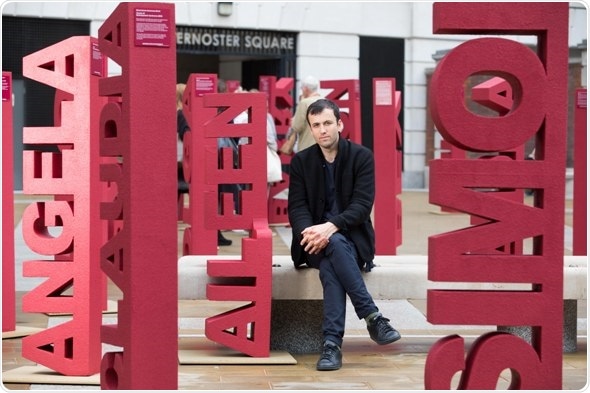Sep 6 2017
Installation of three-dimensional giant letters in the heart of London marks the launch of innovative campaign
As part of Janssen’s commitment to raising awareness of blood cancer, supporting patients with the condition and their families, Janssen has today launched the Make Blood Cancer Visible campaign. The campaign sees Janssen and nine blood cancer patient support groups join forces for the first time to bring much-needed attention to blood cancer across the UK during September, blood cancer awareness month.

Paul Cocksedge, Designer
As part of the campaign, Janssen commissioned designer Paul Cocksedge to create an installation that gathers 104 three-dimensional giant names in Paternoster Square, London for the public to visit until 30 September. The installation represents the 104 individuals that are diagnosed with blood cancer every day raising public awareness and making their experiences visible by exposing their individual stories. Each sculpture is the real name of someone who has been diagnosed with a blood cancer, and is sized to perfectly match their height. The names are arranged to reflect the patterns that occur when people gather in crowds, and set in a recurring typeface intended to emphasize their shared experiences.
Dr Rozlyn Bekker, Business Unit Director, Oncology and Haematology, Janssen UK, said:
Janssen is dedicated to supporting and improving the lives of patients diagnosed with blood cancer. Helping to raise awareness of these types of cancers and working with healthcare professionals and patient support groups to bring about a better understanding of haematological malignancies is an important part of this. We hope that this campaign will help to give a voice to patients living with blood cancer.
Results of a public and a patient survey were also announced today to coincide with the launch of the campaign. According to the Make Blood Cancer Visible public survey implemented by YouGov and funded by Janssen, only one in ten people (N=2,044) are aware that there are over 100 different types of blood cancers, and only 12% of people selected blood cancer as one of the top five most commonly diagnosed types of cancer. Worryingly, 30% incorrectly thought that vomiting, nausea, double vision and / or headaches were the most common warning signs of blood cancer.
The patient survey, carried out by Leukaemia CARE, reveals that before diagnosis, a staggering 80% of those surveyed (n=1,199) did not think their symptoms would turn out to be blood cancer. In addition, 38% of those surveyed admitted that they had never heard of their specific type of blood cancer before their diagnosis, and knew nothing about it.
Diana Jupp, Director of Patient Experience, Bloodwise, said:
Despite 230,000 people being affected by blood cancer across the UK, it is still a much-misunderstood and little-known disease area. We know that low awareness can lead to late diagnosis and can make it hard for people to find the information and support they need, leading to a greater sense of isolation. We are therefore delighted to be a part of this exciting campaign helping to raise awareness of blood cancer throughout this September and it’s great to see so many patient support groups join forces to all do their bit to make blood cancer visible.